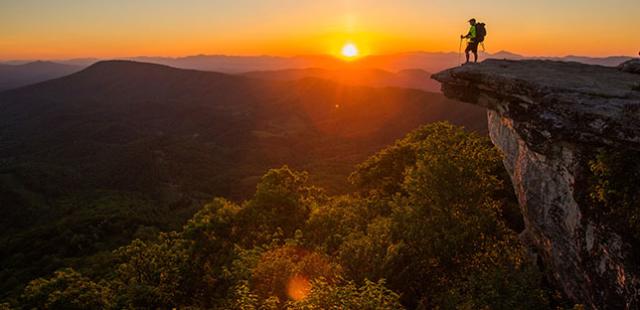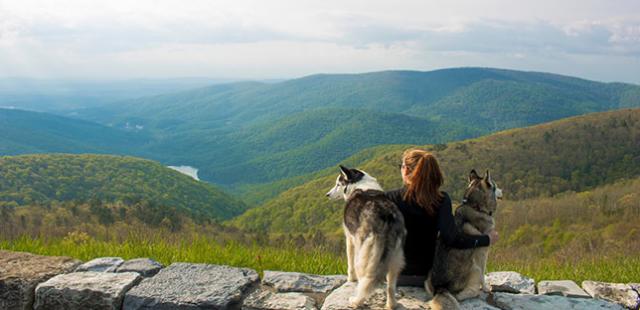“Eco-friendly” isn’t just a slogan to Virginia wineries; it’s their livelihood. They know there’s no top-tier wine without a healthy eco-system, so their commitment to keeping it green shows up everywhere, from the weed-eating sheep in the vineyards to the solar panel roofs on their barns.
Eco-friendliness is also good business; as consumer awareness and concerns grow over climate change, customers are changing their wine-buying habits. Hunter Smith of Champion Hospitality Group, the proprietors of Charlottesville’s Brasserie Saison and six other restaurants, says customers are becoming more interested in “natural” wines (those made without pesticides or herbicides and with few or no additives). Doug Hotz, of nearby Rio Hill Wine & Beer, agrees. “It is definitely part of the wine conversation,” he says.
Here are just a few of the ways Virginia wineries are keeping it green.
VIRGINIA WINE COUNTRY ECO-STARS
When it comes to wineries with sustainable practices, these vineyards go above and beyond, utilizing organic and eco-friendly methods whenever possible.
Loving Cup Winery—North Garden

Photo Credit: Karl Hambsch, @lovingcupwinery
In a state filled with conservation-focused winemakers, Loving Cup Winery stands out: they’re the only certified-organic vineyard and certified-organic winery in the state. Winemaker and vineyard manager Karl Hambsch advocates farming with nature, instead of against it. “This means surrendering absolute control to the mind-numbingly complex systems of life above and below the ground, and then respectfully elbowing out a little space for our grapevines,” he says.
Any grower will tell you it’s all about the water, so respect for preserving it and keeping it healthy runs high. At Loving Cup, the water they use for spraying and irrigation is collected from an underground natural spring via French drains into a ten-thousand-gallon tank buried in the ground, so all the vineyard water is "rescued" and does not come from the aquifer.
In the vineyard, they grow only disease-resistant hybrid grapes—think Corot Noir instead of Pinot Noir—to eliminate the need for chemical sprays, and they rely on insects to do their part. “Ladybugs, lacewings, assassin bugs, spined soldier bugs, parasitic wasps, hoverflies, and others help to achieve the balance, but the real rock stars are the spiders,” says Hambsch. “They are the sentinels always on watch. They are the reason our vineyard works.”
DuCard Vineyards—Etlan

DuCard Vineyards has been green from day one, with wood for their floors and tasting bar recycled from a 100-year-old barn on the property. They’ve been named Greenest Winery in Virginia twice.
The winery’s environmental checklist ticks all the boxes: they’re solar-powered; their cutlery is made from vegetable starch; they compost grape waste to use in their fields and gardens; and they plant wildflowers to feed beneficial insects. DuCard is also a longtime champion of lightweight wine bottles, disregarding the tradition many wineries follow of putting their best wine into ostentatious, heavy (and wasteful) bottles.
In the lee of Old Rag Mountain, DuCard uses an artificial wetland system to process water, and partners with Re-Cork C’ville in a cork recycling program. You’ll no longer find plastic water bottles in the tasting room; they’ve switched to refillable glass. And your electric car can get all charged up while you relax over some award-winning Petit Verdot.
Afton Mountain Vineyards, Afton

Photo Credit: Bill Crabtree Jr.
Afton Mountain Vineyards coined the phrase, “Grapes Don’t Grow in Ugly Places,” and as you feast your eyes on the views from the winery’s windows, you’ll be inclined to agree. Owners Elizabeth and Tony Smith intend to preserve the pristine vista for generations; they bought the adjacent land to keep it development-free.
Like all wineries, Afton Mountain faced the conundrum of what to do with the countless empty bottles left after a weekend of wine tastings, so they purchased a glass-crusher. After crushing, they’re left with sand, which is then earmarked for landscaping projects around the winery. (Brent Manor Vineyards in Faber does the same; owner Jorge Raposo estimates he crushes a couple dozen bottles every weekend.)
Winemaker Damien Blanchon grows grapes the way his family does back in France: he uses no insecticides and sprays his twenty-five acres of vines with herbal teas, which he says bolsters their immune systems. After the grapes are crushed, Blanchon delivers the pomace—leftover skins—to a neighbor to use as livestock feed. He also added goats to Afton’s eco-mix, where they act as nature’s lawn mowers (on the non-vineyard acres; goats love a good grape), and they provide some added value with a bit of natural fertilization, as well.
INGENUITY IN THE VINEYARD
Using Helpful Vineyard Critters

Photo Credit: Steven Morris
High on a mountain in Amherst, Ankida Ridge Vineyards is known as a respite for the soul and a maker of elegant Pinot Noir, but it’s the honeybees, chickens, and sheep who keep everything in order. In the vineyard, the chickens scratch and peck, aerating the soil, while filling up on harmful bugs and larvae. Sheep keep the ground cover trimmed. And both contribute to the vineyard’s reduced use of insecticides and herbicides. Owner Christine Vrooman says, “Environmental awareness is a focus of our farming practices, keeping the soil rich with microbial life and trying to keep the beneficial insects healthy and plentiful. Keeping the vineyard and our farm in balance helps to make balanced wines.”

Photo Credit: Atilla Woodard
Up the road in Charlottesville, Jefferson Vineyards has planted over seven acres of wildflower meadows, which support their 400,000 bees. The result? Increased biodiversity, and two vintages of estate-label honey, which you’ll soon be able to buy at the winery (guests can see a bit of the wildflower project in the gardens that surround the tasting room).

Photo Credit: Tabitha Schreiber, @trapithaa
Loretta Briede of Briede Family Vineyards in Winchester says she wants her wines to be an expression of the grape, not a chemical experiment. To minimize vineyard intervention, her farm relies on an insectary house of ladybugs, green lacewings, assassin bugs, and praying mantis. The insects’ job begins with a “bug release”, where they’re set free to quash the bad bugs, creating a natural balance.
Commitment to Water Conservation

Old House Vineyards in Culpeper has grown quite a bit since the first vines were planted in 1999. What started as a winery now includes a brewery, distillery, and pub kitchen—all of which go through plenty of water. To get more use from that water, the Kearney family is building a wastewater management system where everything gets run through underground tanks and into a rock quarry topped with plant life, then cycled into the wetlands and collected in tanks for farm irrigation.
Knight’s Gambit Vineyard and Jefferson Vineyards have also made a commitment to water: their extensive fencing projects will keep livestock and their natural waste far away from waterways that run into the Chesapeake Bay.
IMAGINATION IN THE WINERY
Harnessing Natural Energy

Glass House Winery
Summer sunlight is abundant in Virginia, and wineries like Hark Vineyards, Sunset Hills Vineyard, Glass House Winery, and Knight’s Gambit Vineyard, among others, are capturing the light to solar-power their business.

Walsh Family Wines
Fifty-Third Winery & Vineyard and Walsh Family Wines went further and became LEED certified through the U.S. Green Building Council. Pearmund Cellars and Barrel Oak Winery run their large operations’ HVAC systems with geothermal, which uses 25-50% less energy.
At Northern Virginia’s Maggie Malick Wine Caves, winemaker Maggie Malick and her husband Mark pour their wines from inside a man-made wine cave. The cave helps them reduce their carbon footprint by maintaining a constant cool temperature year-round for their wines. Of course, there’s also the coolness factor of sipping albariño beneath four feet of earth and grass.
Sustainable Packaging Usage

Photo Credit: Emily Eby
At Bluestone Vineyard in the Shenandoah Valley, customers can spend twelve dollars to refill a growler. Bonus: the keg wines are named after the winemaker’s favorite Grateful Dead lyrics. Or if preferred, guests can buy an assortment of Lee Hartman’s wine in cans. Hartman says the easily-recyclable cans are popular for camping, hiking, and music festivals. “They’re also less of a commitment than cracking into a bottle twice their size. And, no corkscrew,” he says.

Farther up the Valley, Muse Vineyards has also jumped into canned wine. (“You CAN take it everywhere,” says their social media posts, picturing the cans next to a swimming pool or on a mountain top). Muse’s cans are only 250-ml, a “nice, generous single pour,” says owner Sally Muse. Michael Shaps Wineworks in Charlottesville was the first to sell its wines in boxes and also pours from the tap for growlers, carafes, or by the glass at their Wineworks Extended location.
“Glass accounts for about sixty percent of wine’s carbon footprint, mostly through the production and transport of empty and full bottles,” according to Washington Post wine writer Dave McIntyre. He and others in wine media are leading the call for wineries to ditch their heavy bottles and do what Hark Vineyards and Barrel Oak Winery are doing: going light with eco-glass bottles, which are twenty-five percent lighter than the old “normal.”

Photo Credit: Carlita Pitts, @iamthelita
Glass House Winery in Free Union wins the prize for the most creative use of empties; when the county stopped recycling glass, then-owner Jeff Sanders used nearly twenty thousand bottles to build an entire tasting and events building. It’s now a must-see attraction for wine fans from all over.
Chateau Merrillanne chose packaging as a sustainability initiative: they’ve switched from the “what-do-I-do-with-this-now” cardboard wine carriers to reusable bags customers can take to the grocery store.
The challenges around growing and crafting good wine won’t change anytime soon, but neither will the commitment of these and other wineries around the state to keep investing in solutions that help them make wine in a way that also helps the planet. Karl Hambsch, the organic grower and winemaker, says it best: “Loving Cup’s vineyard is on the 150-acre family farm on which I grew up, tromping through the forests and fields with our dog. The hollow has changed quite a bit in forty years, but it is the memory of that unspoiled ‘wilderness’ that inspires us to farm better. We bring with us a commitment to be responsible to our neighbors, our community, our watershed, and beyond.”
How You Can Pitch In
Here are some ways everyone can help make Virginia wine part of the solution.
Buy local: Buying local wine reduces the distance a bottle travels before the cork is popped—a big carbon footprint savings.
Bike on in: Virginia’s backroads are beautiful for biking. Fifty-Third Vineyard in Louisa offers bicycle storage, showers, and changing rooms so guests can swing by on their Cannondales.

Rosemont Vineyards, Photo Credit: Creative Dog Media, @creativedogmedia
Bring back the box: Lots of wineries are happy to get their increasingly expensive cardboard carrying and shipping boxes back. “I will gladly take shipping containers in good condition,” says owner/winemaker Maggie Malick of Maggie Malick Wine Caves. A few more who welcome returns are Breaux Vineyards in Northern Virginia, Cardinal Point Winery and Hill Top Winery & Meadery in Central Virginia; Rappahannock Cellars in the Shenandoah Valley; and Rosemont Vineyards in southern Virginia. If you aren’t sure, ask!
Charge it: More wineries are adding electric car chargers every year. You can fuel up at Knight’s Gambit Vineyard, DuCard Vineyards, Pearmund Cellars, 50 West Vineyards, Sunset Hills Vineyard, and Stone Tower Winery, among others.

